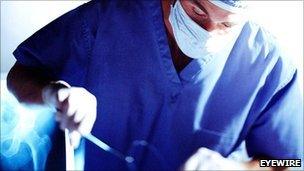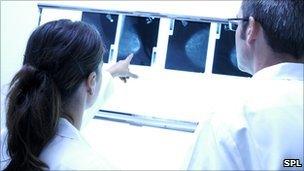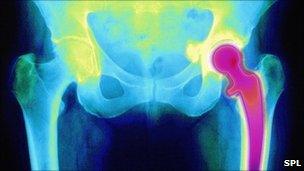Cosmetic surgeon concerned over 'guinea pig' patients
- Published

Some medical devices and implants used in the UK do not have to undergo independent clinical trials
A leading UK cosmetic surgeon claims patients are treated like "guinea pigs" because medical implants do not need to undergo independent clinical trials.
Nigel Mercer spoke out after complaints about problematic breast implants and hip replacements.
Speaking to BBC 5 live he described current regulation as weak, saying the regulator needed to "have teeth".
The Medicines and Healthcare Products Regulatory Agency (MHRA) said it takes its role "very seriously".
Mr Mercer, who is a former president of the British Association of Aesthetic and Plastic Surgeons, says one of the key areas of concern is a breast enhancer called a Poly Implant Prosthesis (PIP). This has been fitted to more than 50,000 women in the UK since it was introduced in 2004.
PIP implants are no longer recommended for use in Britain amid growing evidence that it is prone to rupture, leaving patients in pain and uncertain about the long-term effects.
Catherine Kydd, from Dartford in Kent, only realised her implant had split after being sent for a mammogram and ultrasound scan when she found a lump in her breast.
Her relief at being told she did not have cancer was tempered by anger at the discovery that the silicon in her implants had leaked and spread into her lymph nodes.
"I'm outraged and upset," she told the BBC's 5 live Investigates programme.
"I have to live with that in my body for the rest of my life. No-one can actually tell me if that's going to be a problem in the future or not."
Ms Kidd says she raised her concerns with the MHRA in 2009 but no action was taken at the time.
'Designed for mattresses'
It was only in April this year, after France banned PIP implants, that the MHRA followed suit and advised doctors in the UK not to use them.

The Poly Implant Prosthesis breast enhancement is no longer recommended for use in Britain
Since then, it has emerged that after winning approval for the implant, the manufacturer changed the gel inside the device to one designed for mattresses.
Tests have shown that the strength of the gel-filled shells is not up to standard, increasing the chance they could rupture.
For surgeon Nigel Mercer, this highlights the regulatory confusion surrounding medical devices - a broad-ranging category which includes orthopaedic beds, artificial joints and medicine bottles.
He says unlike drugs, which have a strict testing regime, companies making medical devices have to get a European CE safety mark, which then allows their products to be sold in Britain, often without independent clinical trials.
Mr Mercer said: "A medicine has to be tested very rigorously, it has to go through different levels of testing before it goes to market and that process can sometimes take years.
"It means at every step along the way it's tested for toxicity, to see if people are allergic and it's tested for how it's delivered and how good it is.
"That process costs tens of millions of pounds and takes years to do. With a medical device you go to the two bodies in Brussels who produce CE marks.
"There are existing standards as to how any medical device is produced. As long as you follow those standards, and you have that inspected, you produce that device and sell it."
The result, he says, is that, "the public are being used as guinea pigs."
The MHRA, which is responsible for the regulation of medical devices and equipment used in healthcare, as well as the investigation of harmful incidents, responded by saying:
"The MHRA takes its role very seriously and works with other member states to ensure that only compliant devices are placed on the market."
'Rotting away'
A similar row has also erupted over the use of a new kind of artificial hip manufactured by DePuy, a French subsidiary of the respected manufacturer Johnson and Johnson.

A new artificial hip used in the UK was not required to undergo independent clinical trials before use.
The DePuy ASR hip has now been withdrawn following reports that metal shards broke off and lodged themselves in patients' bodies after being fitted.
Charlotte Bird from Suffolk was one of those who suffered as a result: "It had been rotting away and I had been rotting away around it.
"I couldn't work. It never felt right. It just held me back completely.
"It was completely depressing. Friends were worried about me - it was misery and never getting better."
DePuy has told 5 live Investigates that it was not required to carry out a clinical trial, but says that its artificial hip was subjected to numerous laboratory tests.
These included tests on the materials used, as well as the product's performance using hip simulators which looked at how well the device wore over time.
Since the product was launched, DePuy says it continued to evaluate the ASR hip system.
That is little comfort to Charlotte, who condemned the lack of vigilance among the regulators.
She said she was not told it had not been subject to independent clinical trials.
"I was just told it was marvellous and it was the new way of doing it," she said.
The MHRA says it investigates all reported adverse incidents involving medical devices, where there is a risk of death or serious injury to patients, and takes action when it becomes clear that there is a need to do so. In a statement, the MHRA said:
"We encourage everyone - the public and healthcare professionals, as well as the industry - to tell us about any problems with a medicine or medical device, so that we can investigate and take any necessary action."
However, surgeon Nigel Mercer says recent evidence relating to problems with a number of medical devices suggests this is not good enough:
"The regulator needs to have teeth and be able to regulate these businesses."
You can hear the full report on 5 live Investigates on Sunday, 14 November at 2100 GMT on BBC Radio 5 live.
You can also listen again on the BBC iPlayer or by downloading the 5 live Investigates podcast.
- Published14 October 2010
- Published29 July 2010